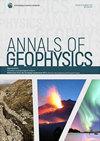EPOS研究基础设施:一种整合固体地球科学数据和服务的联合方法
IF 1.2
4区 地球科学
Q3 GEOCHEMISTRY & GEOPHYSICS
引用次数: 5
摘要
欧洲板块观测系统(EPOS)是一个研究基础设施(RI),致力于通过整合、可访问、使用和再利用固体地球科学数据、研究产品和服务,以及促进对研究设施的物理访问,实现卓越的科学。本文介绍和描述了EPOS RI,并介绍了其交付框架的内容。2018年11月,欧洲研究基础设施联盟(European Research Infrastructure Consortium, EPOS ERIC)获得欧盟委员会的批准,旨在设计和实施一项长期计划,整合欧洲固体地球科学的研究基础设施。具体来说,EPOS的任务是创建和运营一个高度分布式和可持续的研究基础设施,以提供对来自不同固体地球科学学科的统一、互操作和质量控制数据的协调访问,以及用于分析和建模的工具。EPOS依靠领先的电子科学解决方案,并致力于开放获取,从而使地球科学多学科和跨学科科学研究的变化迈出了一步。本文讨论了EPOS体系结构及其交付框架,以展示其对开放科学和FAIR(可查找、可访问、可互操作和可重用)数据管理的贡献,并强调支持EPOS RI的设计、实现和构建的社区建设过程。本文章由计算机程序翻译,如有差异,请以英文原文为准。
The EPOS Research Infrastructure: a federated approach to integrate solid Earth science data and services
The European Plate Observing System (EPOS) is a Research Infrastructure (RI) committed to enabling excellent science through the integration, accessibility, use and re-use of solid Earth science data, research products and services, as well as by promoting physical access to research facilities. This article presents and describes the EPOS RI and introduces the contents of its Delivery Framework. In November 2018, EPOS ERIC (European Research Infrastructure Consortium) has been granted by the European Commission and was established to design and implement a long-term plan for the integration of research infrastructures for solid Earth science in Europe. Specifically, the EPOS mission is to create and operate a highly distributed and sustainable research infrastructure to provide coordinated access to harmonized, interoperable and quality-controlled data from diverse solid Earth science disciplines, together with tools for their use in analysis and modelling. EPOS relies on leading-edge e-science solutions and is committed to open access, thus enabling a step towards the change in multidisciplinary and cross-disciplinary scientific research in Earth science. The EPOS architecture and its Delivery Framework are discussed in this article to present the contributions to open science and FAIR (Findable, Accessible, Interoperable, and Reusable) data management, as well as to emphasize the community building process that supported the design, implementation and construction of the EPOS RI.
求助全文
通过发布文献求助,成功后即可免费获取论文全文。
去求助
来源期刊

Annals of Geophysics
地学-地球化学与地球物理
CiteScore
2.40
自引率
0.00%
发文量
38
审稿时长
4-8 weeks
期刊介绍:
Annals of Geophysics is an international, peer-reviewed, open-access, online journal. Annals of Geophysics welcomes contributions on primary research on Seismology, Geodesy, Volcanology, Physics and Chemistry of the Earth, Oceanography and Climatology, Geomagnetism and Paleomagnetism, Geodynamics and Tectonophysics, Physics and Chemistry of the Atmosphere.
It provides:
-Open-access, freely accessible online (authors retain copyright)
-Fast publication times
-Peer review by expert, practicing researchers
-Free of charge publication
-Post-publication tools to indicate quality and impact
-Worldwide media coverage.
Annals of Geophysics is published by Istituto Nazionale di Geofisica e Vulcanologia (INGV), nonprofit public research institution.
 求助内容:
求助内容: 应助结果提醒方式:
应助结果提醒方式:


